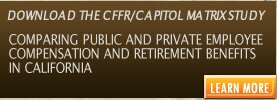Browse all of the research below:
The Pew Center on the States: The Widening Gap: The Great Recession’s Impact on State Pension and Retiree Health Care Costs
April 15th, 2011
Analyzes 2009 and 2010 data on states’ funding of pensions and retiree health care to show how states’ retirement systems—many of them already on shaky ground—were affected by the Great Recession: • Pension funding shortfalls accounted for $660 billion of … Continue reading
Stanford University: Local Unfunded Liability at $137 Billion (Feb 2012)March 7th, 2011
“The unfunded liability for all (local) independent systems is $175 billion. At a 4 percent risk-free discount rate the total increases to $195.2 billion. When including market performance over the past 2 years it is estimated these systems have roughly $200 billion in unfunded liabilities. “ Continue reading
Stanford University: Pension Costs Squeezing State Budget (Dec 2011)February 24th, 2011
“California’s pension plans are dangerously underfunded, the result of overly generous benefit promises, wishful thinking and an unwillingness to plan prudently. Unless aggressive reforms are implemented now, the problem will get far worse, forcing counties and cities to severely reduce services and lay off employees to meet pension obligations.” Continue reading
Legislative Analyst’s Office: Public Retirement Benefits: Options for the FutureFebruary 10th, 2011
PowerPoint presentation with data showing how retirement costs have grown as a percentage of the state General Fund. Recommends benefits changes to align public and private retirement benefits more closely. Continue reading
CATO Journal: “Public Sector Unions and the Rising Costs of Employee Compensation”December 15th, 2010
“The public sector pay advantage is most pronounced in benefits. Bureau of Economic Analysis data show that average compensation in the private sector was $59,909 in 2008, including $50,028 in wages and $9,881 in benefits. Average compensation in the public sector was $67,812, including $52,051 in wages and $15,761 in benefits.” Continue reading
Chris Edwards, CATO Journal: Public Sector Unions and the Rising Costs of Employee CompensationDecember 15th, 2010
The public sector pay advantage is most pronounced in benefits. Bureau of Economic Analysis data show that average compensation in the private sector was $59,909 in 2008, including $50,028 in wages and $9,881 in benefits. Average compensation in the public … Continue reading
Joe Nation, Stanford Institute for Economic Policy Research: The Funding Status of Independent Public Employee Pension Systems in CaliforniaNovember 15th, 2010
“The unfunded liability for all (local) independent systems is $175 billion. At a 4 percent risk-free discount rate the total increases to $195.2 billion. When including market performance over the past 2 years it is estimated these systems have roughly $200 billion in unfunded liabilities. “ Continue reading
Alicia H. Munnell, Jean-Pierre Aubry, and Laura Quinby, The Center for Retirement Research at Boston College: The Impact of Public Pensions on State and Local BudgetsNovember 13th, 2010
“Whereas public plans are substantially underfunded, in the aggregate they currently account only for 3.8 percent of state and local spending. Assuming 30-year amortization beginning in 2014, this share would rise to only 5 percent, and even assuming a 5 percent discount rate, to only 9.1 percent… Continue reading
Robert Novy-Marx and Joshua Raugh, University of Rochester and Kellogg School of Management and NBER: The Crisis in Local Government Pensions in the U.S.October 15th, 2010
“Using local government accounting methods, the total unfunded liability in local governments is $190 billion or over $7,000 per municipal household…When government accounting is corrected by discounting already-promised benefits at zero-coupon Treasury yields, the total unfunded obligation is $383 billion or over $14,000 per local household… Continue reading
Dr. Stuart Buck, The Foundation for Educational Choice: Trouble Brewing: The Disaster of California State PensionsOctober 15th, 2010
“If these obligations are re-calculated using a discount rate approximating what private pensions are allowed to use, liabilities reach $282.2 billion, a figure that rises to $326.6 billion when current market values are taken into account… Continue reading
Milken Institute: Addressing California’s Pension Shortfalls: The Role of Demographics in Designing SolutionsOctober 15th, 2010
“If no action is taken, the combined liability of the three major state pension funds will be more than 5.5 times as large as total state tax revenue around 2012-2013… Continue reading
California Center for Public Policy: Reforming Public Employee Compensation and PensionsOctober 6th, 2010
“The $2 to $5 million in annuity value that (public safety) employees may receive through pension programs in their early to middle fifties makes these employees’ comprehensive career compensation among the highest in America… Continue reading
Civil Grand Jury of San Francisco: Pension Tsunami: The Billion Dollar BubbleJune 15th, 2010
“Retiree pension and health benefits will amount to $1 billion in the next five years for San Francisco, which is roughly one-third of the City’s General Fund… Continue reading
Adam B. Summers, The Reason Foundation: How California’s Public Pension System Broke (And How We Can Fix It)June 15th, 2010
“Since 1998, California’s state workforce has grown by 31 percent and taxpayers now pay for more than 356,000 state workers…Since 2008, California has added over 13,000 employees to the state payroll during this recession. Continue reading
Adam Summers, Reason Foundation: Comparing Private Sector and Government Worker SalariesMay 15th, 2010
“Several analyses of average wages and benefits in the public and private sectors reveal that state and local government workers earn more than private sector workers. According to the most recent Employer Costs for Employee Compensation survey from the U.S. … Continue reading
Amy B. Monahan, University of Minnesota Law School: Public Pension Plan Reform: The Legal FrameworkMarch 15th, 2010
“States should be free to set new contract terms for services not yet rendered. Denying states the ability to renegotiate future benefits to reflect changing economic conditions is unfair to taxpayers when all other aspects of the employment relationship can be renegotiated. “ Continue reading
Office of the Controller: Public Retirement Systems Annual ReportMarch 15th, 2010
“The median percentage of disability retirees to all retirees receiving benefits, survivors not included, was 12.4% during the period covered by this report. These percentages ranged from 0% to 100%. Since most of these systems had similar benefits, the wide range appears to be the result of differing policies and practices of individual retirement boards in administering disability retirements.” Continue reading
Howard Bornstein, Stan Markuze, Cameron Percy, Lisha Wang, and Moritz Zander, Stanford Institute for Economic Policy Research: Going for Broke: Reforming California’s State Pension SystemMarch 15th, 2010
“By applying a “risk-free discount” rate to accrued liabilities, this study estimates the combined shortfall for CalPERS, CalSTRS and UCRS to be roughly $425 billion as of June 30, 2008. With recent market losses, the combined shortfall could be over half a trillion dollars. “ Continue reading
The Pew Center on the States: The Trillion Dollar Gap: Underfunded State Retirement Systems and the Road to ReformFebruary 15th, 2010
“Retiree health care and other non-pension benefits create another huge bill coming due: a $587 billion total liability to pay for current and future benefits, with only $32 billion—or just over 5 percent of the total cost—funded as of fiscal year 2008. Half of the states account for 95 percent of the liabilities.” Continue reading
Dr. Barry W. Poulson and Dr. Arthur P. Hall, American Legislative Exchange Council: State Pension Funds Fall Off a CliffJanuary 15th, 2010
“The solution to the funding crises in state pension plans will require fundamental reform. Everything should be on the table, including changes in benefits and increased employee contribution rates, as well as employer contribution rates. These plans should consider replacing … Continue reading
Public Policy Institute of California: “Californians and their Government”January 10th, 2010
Three of every four Californians view the amount of money being spent on the public employee pension systems as a problem. Continue reading
Robert Novy-Marx and Joshua D. Rauh, Journal of Economic Perspectives: The Liabilities and Risks of State-Sponsored Pension PlansOctober 15th, 2009
Nationally, pension funds are underfunded by $3.23 trillion…Total state debt with pension liabilities is 4.5 times the value of outstanding state bonds…Unfunded pension debt owed to each plan participant is $161,500, or $10,625 for every man, woman and child in … Continue reading
Journal of Economic Perspectives: “The Liabilities and Risks of State-Sponsored Pension Plans”September 15th, 2009
“Nationally, pension funds are underfunded by $3.23 trillion… Continue reading
Employee Benefit Research Institute: Benefit Cost Comparisons Between State and Local Governments and Private Sector EmployersJune 15th, 2008
“Overall total compensation costs as of September 2007 were 51.4 percent higher among state and local government employers ($39.50 per hour worked) than among private-sector employers ($26.09 per hours worked)… Continue reading
The PEW Center on the States: Promises with a Price: Public Sector Retirement BenefitsDecember 15th, 2007
“At least five states now offer hybrid plans that combine elements of both defined contribution and defined benefit. According to a September 2007 report by the U.S. Government Accountability Office, Oregon officials estimate that the new hybrid program adopted in 2003 contributed to over $400 million in pension reform savings. “ Continue reading



